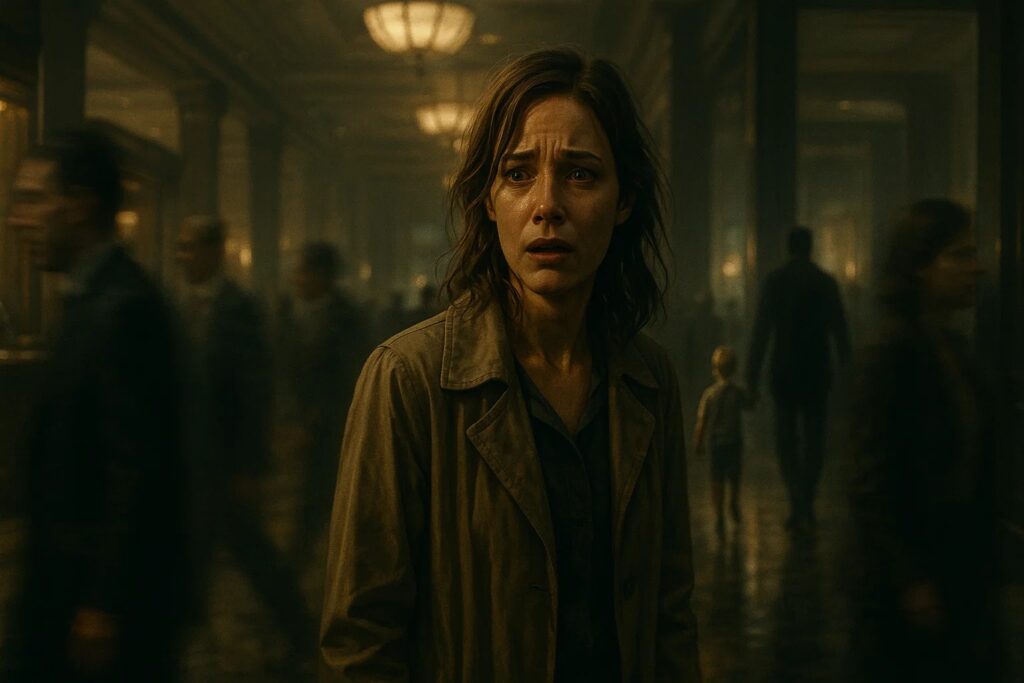
Let’s break this down, Jeremy Jahns–style, energetic, conversational, and straight to the point, because this movie deserves a full cinematic exploration.
Setting the Stage: A Family Drama With Thriller Undertones
Before we dive into the truth factor, let’s recap what the movie is about. The Deep End of the Ocean is adapted from Jacquelyn Mitchard’s debut novel of the same name, which became an instant bestseller in 1996. The book struck such a nerve with readers that Hollywood swooped in quickly to turn it into a film.
At its core, the story is about Beth Cappadora (Michelle Pfeiffer), a mother whose world implodes when her three-year-old son, Ben, vanishes in a crowded hotel lobby. One moment he’s there, the next he’s gone. No screams, no chaos, just absence. Every parent’s worst nightmare comes alive in those few minutes.
The story then jumps nine years into the future. Ben is gone, Beth is broken, and the family is just barely surviving. But here’s the twist: the boy is found alive, living as Sam with another family just a few blocks away. And suddenly, this isn’t just a story of loss, it’s a story of what happens when the lost is found, but nothing is the same anymore.
So, Is The Deep End of the Ocean Based on a True Story?
The short answer: No, it’s not directly based on real events.
But like many powerful dramas, it taps into something very real, universal parental fears and news headlines from the late 20th century. The 1980s and 1990s were packed with high-profile child abduction cases, some of which had tragic endings and others that, like Ben’s story, ended with shocking reunions years later.
Jacquelyn Mitchard, the author, has mentioned that while she didn’t base the novel on one specific case, she drew inspiration from the very real emotional landscape of families grappling with abduction. In other words, the story is fiction with its roots in reality’s darkest corners.
Who Kidnapped Ben in The Deep End of the Ocean?
This is where things get tricky. In the film, Ben isn’t kidnapped by a stranger with sinister motives. Instead, he’s taken by Cecilia Lockhart, the mentally unstable neighbor of the hotel. She hands the boy over to her brother George, who raises Ben as Sam. George isn’t painted as a monster; he’s a man who genuinely loves the boy, albeit under false pretenses.
That’s what makes this story unique. It’s not a crime thriller where the villain twirls a mustache. It’s a morally gray story. George isn’t abusive, and Ben grows up happy as Sam. So when the truth comes out, the real conflict isn’t just about a crime, it’s about identity, love, and what makes someone a parent.
Is Sam Actually Ben?
Yes. The big reveal is that Sam, the boy living just blocks away from the Cappadora family, is indeed Ben. The police confirm it, DNA confirms it, and the family has to confront the surreal reality that their son has been living a totally different life under another name.
This reveal could have easily felt like a soap opera twist. But the way the movie handles it, especially with Pfeiffer’s performance, keeps it grounded. It’s not just “Hey, surprise, your kid’s alive!” It’s: “Your kid is alive, but he doesn’t remember you, and he doesn’t want to leave the life he knows.”
That’s a gut punch of storytelling right there.
What Is the Real Ending of The Deep End of the Ocean?
The movie’s ending has stirred up plenty of discussion. In the final scenes, Ben/Sam returns to spend the night with his biological family. He walks into the house, unsure, hesitant, almost like a guest rather than a son. And Beth, instead of smothering him with desperation, gives him space. She simply says: “Come on in.”
It’s an ambiguous ending. There’s no magical fix, no “happily ever after.” Instead, it leaves you with a quiet, hopeful note. Healing takes time. Rebuilding bonds takes time. The ending reflects that reality, painful, messy, and uncertain, but not without hope.
Interestingly, the book’s ending carries a slightly more definitive tone. In Mitchard’s novel, there’s more closure around Ben’s decision to stay connected with both families, offering a bittersweet balance. The film keeps it more open-ended, leaving audiences to wrestle with the emotions.
Themes That Hit Hard
One of the reasons The Deep End of the Ocean resonates, even decades later, is because it doesn’t rely on cheap thrills. Instead, it dives into heavier themes:
Identity: Who are we without our memories? Sam struggles with being Ben because his identity has been shaped by a different family.
Motherhood: Beth’s grief, guilt, and resilience make her a layered, complex character. Pfeiffer nails this role by balancing fragility with strength.
Forgiveness and Healing: The movie asks tough questions, can you forgive those who wronged you, even if they believed they were doing good? Can a family heal after nearly a decade of grief?
These aren’t easy questions, and the film doesn’t spoon-feed answers. That’s part of why it sticks with you.
The Performances That Carried the Film
Let’s talk cast, because this movie is stacked.
Michelle Pfeiffer (Beth Cappadora): Pfeiffer delivers one of her most underrated performances. She captures the anguish of a mother living with the unthinkable, and later, the awkward, painful joy of reunion.
Treat Williams (Pat Cappadora): As the father, he balances Beth’s emotional turmoil with a steadier, if not detached, presence. His coping mechanism is denial, and Williams sells it.
Jonathan Jackson (Vin): Playing the older brother who witnessed the abduction, Jackson gives a heartbreaking performance. The trauma of that moment defines his character, and you feel his guilt every time he’s on screen.
Ryan Merriman (Ben/Sam): This role is tricky, he’s essentially playing two kids in one. Merriman pulls it off by showing both the warmth of Sam and the confusion of Ben.
Without this cast, the movie could have easily turned into melodrama. Instead, it lands as an emotionally complex family drama.
Reception: Critics vs. Audiences
Here’s where the divide comes in. Critics weren’t exactly kind to The Deep End of the Ocean. Rotten Tomatoes has it sitting at a rough score, with complaints that the pacing is slow and the drama feels heavy-handed. Roger Ebert himself gave it a lukewarm review, saying the film didn’t dig deep enough into its own emotional material.
Audiences, however, were more forgiving. Many viewers connected with the raw emotional core of the story, especially parents who understood the terror of losing a child. Sometimes movies don’t need critical acclaim to find a place in people’s hearts, and this is one of those cases.
Was There Ever a Sequel?
This is one of the top questions people ask: is there a sequel?
The answer: No.
Neither the book nor the film ever got a sequel. Mitchard did write many more novels, but she never revisited the Cappadora family. And honestly, that might be for the best. The ambiguity of the ending works because it leaves space for interpretation. A sequel might have tied things up too neatly, robbing the story of its haunting power.
True Story Vibes: Why People Think It’s Real
Even though The Deep End of the Ocean is fiction, its believability comes from how closely it mirrors real-life cases. In the 1980s and 1990s, child abduction was a massive public fear. News programs regularly featured missing children, and photos appeared on milk cartons across America.
That cultural backdrop is why the novel (and later the film) felt so authentic. It wasn’t telling one family’s true story, it was telling every parent’s nightmare. That’s why so many viewers still ask if it’s based on real events.
Production Notes: From Bestseller to Big Screen
The road from book to film was surprisingly fast. Mitchard’s novel dropped in 1996, Oprah picked it for her book club (instantly skyrocketing its popularity), and by 1999 the film was out in theaters. That’s a rare turnaround in Hollywood.
The film was directed by Ulu Grosbard, a seasoned director known for focusing on intimate character studies. And while he delivered a faithful adaptation, some argue he played it too safe. The book’s emotional punches don’t always land as hard on screen.
Still, the film managed to capture the spirit of Mitchard’s story. And thanks to Pfeiffer’s performance, it remains a memorable entry in late-90s cinema.
Why the Film Still Matters Today
You might be wondering: why revisit this movie in 2025?
Because stories like The Deep End of the Ocean don’t age. Parents still worry about their kids in crowded places. Families still grapple with loss, identity, and healing. The questions raised by this story, about what makes a family, about how we forgive, about how we move forward, are timeless.
And let’s be real: we’re living in an era where true crime and real-life mysteries dominate streaming platforms. That’s why people keep circling back, asking if The Deep End of the Ocean is based on a true story. It feels real because it could be real.
Truth in Fiction
So, is The Deep End of the Ocean a true story?
No, it’s fiction. But it’s fiction rooted in very real fears, emotions, and cultural moments. And sometimes, that kind of truth hits harder than any documentary.
The movie may not have wowed critics, but it carved out a space for itself as a haunting, emotional drama. It’s not a perfect film, but it’s one that lingers. And if you’ve ever held a child’s hand in a crowded place and felt that split-second of panic when they tugged away, you’ll understand why this story still resonates.

I am Jeremy Jahns – Your Cinematic Explorer
Immerse in movie reviews, Hollywood insights, and behind-the-scenes stories.